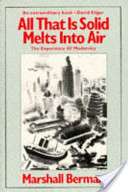All That Is Solid Melts into Air
All That Is Solid Melts into Air is a book by Marshall Berman written between 1971 and 1981, and published in New York City in 1982. The book examines social and economic modernization and its conflicting relationship with modernism. The title of the book is taken from The Communist Manifesto by Karl Marx and Friedrich Engels.[1]
 | |
| Author | Marshall Berman |
|---|---|
| ISBN | 978-0-86091-785-4 |
Berman uses Goethe's Faust as a literary interpretation of modernization, through the processes of dreaming, loving and developing. In the second section he uses Marxist texts to analyze the self-destructive nature of modernization. In the third section French poetry (especially Baudelaire) is used as model of modernist writing, followed by a selection of Russian literature (Pushkin, Dostoyevsky, Bely, Gogol and Mandelstam) in the fourth section. The book concludes with some notes on modernism in New York City during the 1960s and 1970s.[2] New York City's subway map is said to have been designed in accordance with Berman's vision of modernity, presented in the book. Berman recalls: "It was a thrill when the man who had designed New York's marvelous Subway Map came up to me on Broadway, and said that all the time he was putting his map together, he had tried to keep my book in mind."[2]
See also
References
- Marx and Engels, Collected Works (London, Lawrence & Wishart), vol. 6 (1976), p. 487.
- Berman, Marshall. "All That Is Solid Melts Into Air — Afterword 2010" (PDF). Globality Studies Journal. 21: 1.
Further reading
- Leonard, John (January 8, 1982), "Books Of The Times (review)", The New York Times[1]
- "Books Of The Times". Retrieved 2018-04-13.